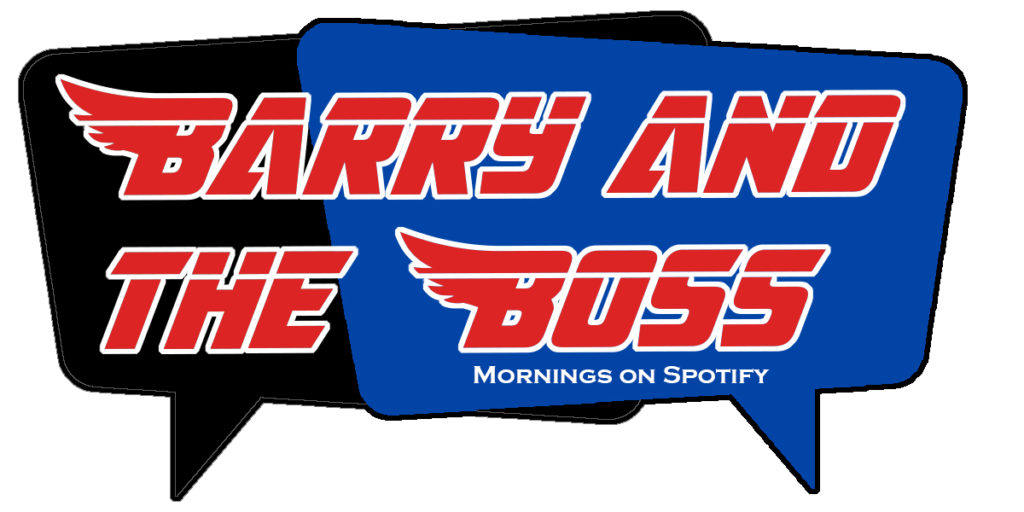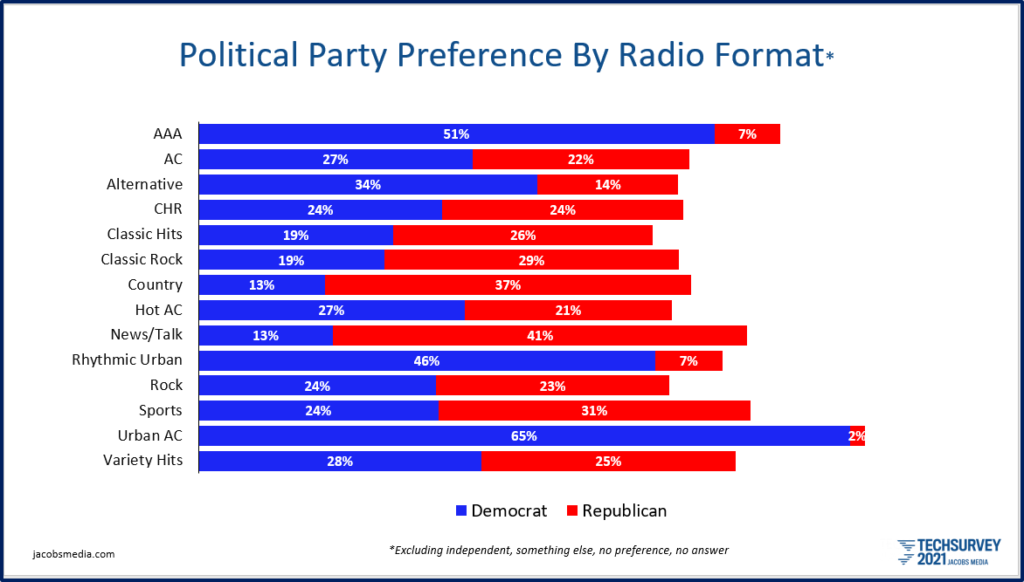
I talked to a lot of people late last year who all agreed on the same thing – they couldn’t wait for the presidential election to be over.
And of course even after Election Day, it wasn’t over. It dragged on through the end of 2020, and right up until the drama around Inauguration Day. And in between, it was all politics, all the time – hitting the crescendo on the “insurrection” that took place in Washington, D.C., on January 6th.
But even since then, the political headlines have come hot and heavy. The COVID stimulus bill, cabinet confirmations (or rejections), the Texas winter disaster, new commissions and hearings, ongoing litigation – it’s been non-stop.
If you thought for a moment that a new resident in the White House would cool things down, then you haven’t been following the research tea leaves. In fact, Nielsen’s release of January numbers in the nation’s biggest markets are already showing continued high listenership for news/talk stations on both the commercial and public radio ends of the spectrum.
Many of you know this anecdotally at the station level – more listener complaints, blow-ups on social media, and other signs the audience is cranky, restless, and angry. And at times, downright uncivil.
That’s all been confirmed in a new paper published in the Journal of Public Policy & Marketing, and covered by Reason. The researchers sum it up this way:
Everything is becoming politicized.
One of the big stories that is still fomenting revolves around Ted Cruz’s ill-fated decision to escape from the sub-freezing temperatures of Texas to head to Cancun for a family getaway at the Ritz-Carlton. Of course, he’s now paying dearly for that decision, as the memes have continued to spiral on social media and on all the cable news channels.

But one of the less-publicized aspects of the “Cancun Cruz” story involves the power of radio – as unlikely as that may seem.
In fact on the day after the story broke, The Hill‘s Jordan Williams reported that a political action committee that calls itself No Excuses launched an ad blitz that called the Cruz out.
The interesting thing about the campaign – it was all on radio. And it ran on a reported 147 radio stations across Texas.
You can hear the ad in a Twitter post from Washington Post correspondent Dave Weigel.
No Excuses PAC, which ran ads in WV urging Manchin to support $1400 checks, is putting up a radio ad in Texas on Cruz’s “Mexican vacation.” 147 stations pic.twitter.com/s13iRxbcpW
— Dave Weigel (@daveweigel) February 18, 2021
I reached out to No Excuses to gain some insight as to “why radio?” And no response.
But I think we all know the beauty of radio, especially for a quick sale, a power outage, or for a politically fueled rapid-response campaign. Radio is quick, it’s easy to produce, it covers a wide base of Americans, and it’s inexpensive.
Their quick-hit campaign against Cruz isn’t the only example of No Excuses using radio. In fact, they’re not just going after Republicans. On their website are radio ads aimed at Senator Joe Manchin in West Virginia and Arizona’s Kyrsten Sinema – two moderate Democrats the PAC is trying to influence.
are radio ads aimed at Senator Joe Manchin in West Virginia and Arizona’s Kyrsten Sinema – two moderate Democrats the PAC is trying to influence.
It is fascinating to see radio used as a heat-seeking marketing missile in these political persuasion and pressure efforts. And as every day becomes its own political cycle, there will be more of these agile, Ninja-like radio campaigns.
And that leads us to some brand new insights from the yet-to-be-released Techsurvey 2021 that came out of the field earlier this month.
To affirm the premise of this blog post – “politics is everything” – we have been asking core radio listeners about their political party preferences these past few cycles.
In our study, those who identify as Republicans lead those who say they’re Democrats by a narrow 27%-24% margin.
But like 6+ numbers in Nielsen or the horse race in national polls, the story always changes when you drill a little deeper, especially down to the state and local levels.
In radio-speak, the most powerful granular view is by format. And in Techsurvey, we break out our 40,000+ radio fans across 14 different formats. And they tell 14 very different stories.

On the chart, Independents, third party supporters, and those who did not make a choice are not shown.
Obviously, some formats are cut and dried. There’s lot of “redness” around News Talk and Country. Conversely, the Urban formats, Triple A, and Alternative are quite “bluish.”
And there are all the other formats where preferences are more ambiguous – or should we say “divided.” In a few cases – Variety Hits, Rock, and CHR – the split is essentially 50:50. And that means that when pretty much anything controversial occurs, there may be some unhappy people on the receiving end. And yes, some of them may be carrying diaries or meters.
As programmers know, political flames can rise up during a morning show conversation, a news report, a talk topic, and these days, sporting events – all of which have been highly politicized these past few years.
Even musical artists don’t escape the scrutiny – and occasional wrath from listeners. What if your country station still is playing Morgan Wallen? Or more likely, what if your station’s ownership told you not to play him? Either way, people are P.O.’d.
And this headline blared this morning in Radio Ink:
Morgan Wallen Tops The Chart – Without Radio?
Apparently so. Whether it’s a backlash against the radio bans and the criticism, supporting fans, or something else in entirely, this entire incident that boiled over because of racist comments made by the artist has been politicized to the max.
 On the rock/pop side of the spectrum, Ted Nugent, Kid Rock, Jon Bon Jovi, and Taylor Swift are among the growing numbers that have taken sides these past few years – and especially during this past election cycle.
On the rock/pop side of the spectrum, Ted Nugent, Kid Rock, Jon Bon Jovi, and Taylor Swift are among the growing numbers that have taken sides these past few years – and especially during this past election cycle.
While each has elated large groups of their fans with their politicking, vast numbers are also turned off. Some even boycott artists that are strongly identified with either end of the spectrum.
Radio is no different. Whether it’s a morning show that steps out, a talk show host that takes a stand, or even a sports host who mentions the National Anthem, it might make some sense to do that cost-benefit analysis.
Bruce Springsteen did that calculation back in 2008 when Barack Obama faced John McCain for the presidency. And he hasn’t let up, continuing to support Democrats, including Biden/Harris this past November.
So, it should come as no surprise that last week’s big celebrity podcast announcement (there’s at least one each week) heralded a co-hosted show on Spotify featuring former President Obama and Bruce Springsteen.
It will be called “Renegades: Born in the USA” (I like my name better), and will spotlight some of the bigger issues of the day. This includes “race, fatherhood, marriage, and the state of America,” according to Spotify. And it’s another sign that the worlds of politics, music – and yes, radio – are intertwined.
https://www.youtube.com/watch?v=BAeIskxCnSc
It’s another sign that entertainment brands aren’t immune from politics. In fact, more and more producers and artists are leaning into the issues of the day, even though they divide us.
And when it comes to how younger consumers see it, standing for something is becoming of greater importance. 5W Public Relations’ 2020 Consumer Culture Report, an online survey of 1,001 Americans taken in late 2019, consistently shows how Millennials are far more attuned to causes and values in their commerce. It’s hard to imagine the events of 2020 – COVID, the economy, race relations, the election – didn’t intensify these feelings among these young consumers:

You want to connect with and engage young consumers? Better take a stand, as uncomfortable and dangerous that may be for brands. It’s a tough position for companies – and media outlets – to navigate.
Reason’s J.D. Tuccille doesn’t have the answers – none of us do. But he concurs with the researchers’ answer to the question:
Is there anything that politics can’t ruin?
And the answer is a definitive “no.”
As the study summarizes, “Ultimately, polarization harms mental and physical health, financial welfare, relationships and societal interests through its impact on psychology, marketing and public policy outcomes.”
In essence, today’s political environment works against us, our livelihoods, and our lives.
Tuccille accepts those “givens,” but concludes that giving people “less reason to fight” should be a goal. And one way to do that is to try to reduce the role politics plays in every decision we make personally – and at our radio stations.
Earlier this week, Entercom’s Detroit radio cluster announced a new community initiative in collaboration with the area’s pro sports teams – the Tigers, Lions, Red Wings, and Pistons – “Vaccinate Michigan.”
Michigan.”
They’ll be running personality PSAs on all the stations – radio hosts as well as each team’s celebrity jocks.
Will there be blowback from anti-vaxxers who will be up in arms about the safety of the vaccines?
Of course.
Will the cluster hear from riled up Michigan listeners arguing whether COVID is really a problem even after a half million deaths?
More than likely.
And will hacked off listeners argue that athletes and entertainers should just do their jobs and not take a stand?
Bet on it.
Credit to Entercom Detroit SVP/Market Manager Debbie Kenyon and her team, along with the area’s professional sports franchises for putting it together, pulling it off, and having the courage to fend off the inevitable vitriol.
Sometimes, you just have to say, “Screw the politics. Let’s use our power, our influence, and our local roots to do something positive for our community.”
Amen.
- What To Do If Your Radio Station Goes Through A Midlife Crisis - April 25, 2025
- A 2020 Lesson?It Could All Be Gone In A Flash - April 24, 2025
- How AI Can Give Radio Personalities More…PERSONALITY - April 23, 2025




Anyone else miss the Fairness Doctrine?
Broadcasters hated it, but you could make the case we were all better off when it was in effect.
About as much as I miss any other doctrine or forced belief. Besides, the phrase itself even smacks of Orwellian “New Speak.” Fairness Doctrine, heh. It reminds me of the kindergarten teacher telling everyone to “play nice” and when they eventually don’t, someone always ends up in the corner.
I still say that Bruce and Obama’s podcast should have been named, “A Shot and a Beer”
Or as my Dad used to say, “SOMEONE’S going to end up crying.” And I like the name. We could make a meme out of that.
Debates about “fairness” slip into the twilight zone where you have to determine whether fairness requires that fact be balanced with fiction–inherently hazardous for media types when political parties line up on opposite sides of that divide. You want to be seen as unbiased, but that is hard when siding with demonstrable fact (against fiction) has become ground for an allegation of bias.
It’s almost impossible to be “unbiased.” And even if there were a Fairness Doctrine, brands and hosts would be accused of being biased.
Responsible journalism is rarely taught anymore and good radio journalists aren’t in station budgets anymore. I’ve heard many things in radio news reports that I have managed to responsibly fact check in minutes and found them to be bogus. Left and right leaning outlets are equally irresponsible.
“But I think we all know the beauty of radio, especially for a quick sale, a power outage, or for a politically fueled rapid-response campaign. Radio is quick, it’s easy to produce, it covers a wide base of Americans, and it’s inexpensive.” Bingo! Thank you, Fred.
Appreciate it, Clark.
I don’t envy executives who have to wrestle with the question whether to take a stand on matters of public policy. I am in the “boomer” cohort and it is fine with me if a company/brand refrains from doing this. After all, the point of business is–business. However, if they do, they put me in the position of having to decide how it affects me.
If they take a position I favor, no problem, I’m more inclined to give them my custom. But, dammit, when they appear to have taken (and acted on) a position I find abhorrent, how can I patronize them in good conscience? I frequently spend time in Florida, and it turns out a major grocer there has been supporting political troglodytes; and now I’ll have to go to other grocers for my yogurt, cold cuts, etc, thankful that they focused on business and “kept their clothes on.”
The fact that it’s so generational is what amps of the degrees of difficulty for brands. Many Boomers don’t care, but their kids (and grandparents do).
And BTW, Publix will survive without you!
Thanks for the comments, John.
As a Florida kid, (grew up in Fort Lauderdale when it was just a funky little seasonal tourist town) my god do I miss Publix. HEB is close, but no cigars. I don’t however miss the people who shop at Publix, which is why I left South Florida in the first place.
Have you ever played the “Florida Man” game? Google “Florida Man” and your birthday.